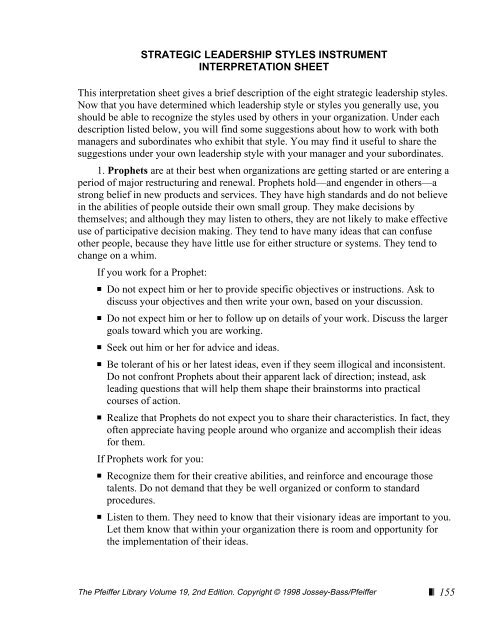motivational analysis of organizations
motivational analysis of organizations
motivational analysis of organizations
You also want an ePaper? Increase the reach of your titles
YUMPU automatically turns print PDFs into web optimized ePapers that Google loves.
STRATEGIC LEADERSHIP STYLES INSTRUMENT<br />
INTERPRETATION SHEET<br />
This interpretation sheet gives a brief description <strong>of</strong> the eight strategic leadership styles.<br />
Now that you have determined which leadership style or styles you generally use, you<br />
should be able to recognize the styles used by others in your organization. Under each<br />
description listed below, you will find some suggestions about how to work with both<br />
managers and subordinates who exhibit that style. You may find it useful to share the<br />
suggestions under your own leadership style with your manager and your subordinates.<br />
1. Prophets are at their best when <strong>organizations</strong> are getting started or are entering a<br />
period <strong>of</strong> major restructuring and renewal. Prophets hold—and engender in others—a<br />
strong belief in new products and services. They have high standards and do not believe<br />
in the abilities <strong>of</strong> people outside their own small group. They make decisions by<br />
themselves; and although they may listen to others, they are not likely to make effective<br />
use <strong>of</strong> participative decision making. They tend to have many ideas that can confuse<br />
other people, because they have little use for either structure or systems. They tend to<br />
change on a whim.<br />
If you work for a Prophet:<br />
■ Do not expect him or her to provide specific objectives or instructions. Ask to<br />
discuss your objectives and then write your own, based on your discussion.<br />
■ Do not expect him or her to follow up on details <strong>of</strong> your work. Discuss the larger<br />
goals toward which you are working.<br />
■ Seek out him or her for advice and ideas.<br />
■ Be tolerant <strong>of</strong> his or her latest ideas, even if they seem illogical and inconsistent.<br />
Do not confront Prophets about their apparent lack <strong>of</strong> direction; instead, ask<br />
leading questions that will help them shape their brainstorms into practical<br />
courses <strong>of</strong> action.<br />
■ Realize that Prophets do not expect you to share their characteristics. In fact, they<br />
<strong>of</strong>ten appreciate having people around who organize and accomplish their ideas<br />
for them.<br />
If Prophets work for you:<br />
■ Recognize them for their creative abilities, and reinforce and encourage those<br />
talents. Do not demand that they be well organized or conform to standard<br />
procedures.<br />
■ Listen to them. They need to know that their visionary ideas are important to you.<br />
Let them know that within your organization there is room and opportunity for<br />
the implementation <strong>of</strong> their ideas.<br />
The Pfeiffer Library Volume 19, 2nd Edition. Copyright © 1998 Jossey-Bass/Pfeiffer ❚❘ 155

















